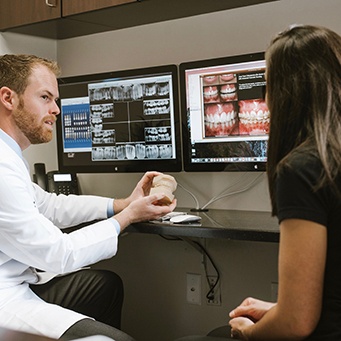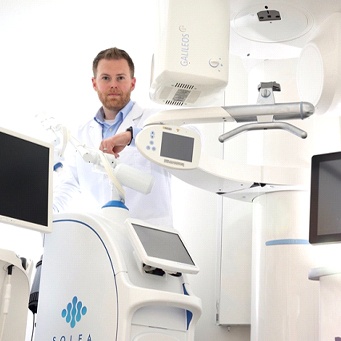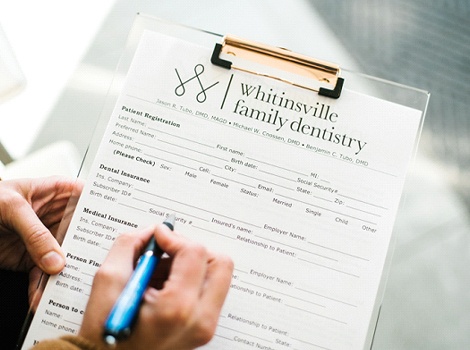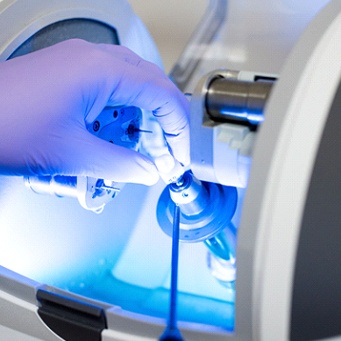Dental Implants – Whitinsville, MA
Effective, Reliable Tooth Replacement

While there are multiple methods to replace teeth, dental implants in Whitinsville are the only solution designed to replace both the root and the crown at the same time. With this form of replacement, you’re getting a tooth that most effectively resembles natural tooth structure. Thanks to their versatility, you can even replace several teeth at a time, including an entire arch, with the help of dental implants. To learn if you’re eligible for treatment from our qualified dentists, call our dental office today!
Why Choose Whitinsville Family Dentistry for Dental Implants?
- Dental Implants Placed & Restored In-Office
- Computer-Guided Dental Implant Surgery for Safer, More Precise Treatment
- In-House Dental Financing Available
What Are Dental Implants?

A dental implant is a small titanium post that is surgically placed in the jawbone to act as an artificial tooth root. Titanium is a biocompatible material, allowing the implant to permanently fuse to your jaw. The result is a sturdy and stable foundation for your replacement teeth. After we install metal fixtures called abutments atop your implants, we can place your custom-made dental crown, bridge, or denture, completing your smile with a solution that looks as natural as it feels.
The 4-Step Dental Implant Process

The process of receiving your dental implants is one that requires time and patience, but you can feel confident knowing our team will be with you every step of the way. Our Team of Dentists can actually perform every part of the dental implant procedure right here in our office, making the treatment more convenient. While the tooth replacement process will differ from patient to patient, there are four basic steps that everyone goes through.
Initial Dental Implant Consultation

The initial consultation is the most important part of the entire dental implant placement process. Why? Because it allows us to fully examine your smile and map out a thorough treatment plan for your new smile. Using a CT/Cone Beam Scanner, your dentist in Whitinsville will capture a high-resolution, 3D cross-section of your jaw, teeth, and entire facial and oral structures in one minute.
Also, Dr. Tubo will take digital impressions of your teeth, gums, and jaw, creating 3D photos. In reviewing the images captured by both the CT Scanner and the digital impressions system, he can identify if there are areas of the bone that need additional growth, which would require a bone graft or sinus lift.
Once he has the X-Rays and photos, he will then use what is known as a SICAT Implant Surgery Guide. This piece of advanced dental technology makes it possible for us to provide a more accurate and precise treatment plan, making sure all your implants are going in the correct locations and at the ideal positions. It is even possible for Dr. Tubo to create a temporary crown before the implant has been created.
Dental Implant Surgery

Should you require any pre-dental implant surgery (i.e., bone graft, sinus lift), you will need to fully heal before moving forward with your dental implant placement. Once you are cleared for surgery, our team will use the guide created during the consultation phase to pinpoint the exact location for your implants. After administering a local anesthetic and/or sedative, we will use titanium posts and surgically place them into your jawbone. Once the tissues surrounding the implants are sutured, you will be required to spend the next three to six months at home recovering.
Dental Implant Osseointegration/Abutment

Because your implants are mimicking natural tooth roots, it is necessary for a process known as osseointegration to occur. This is when the implant fuses with the bone and surrounding tissues. Once this is complete, you will have a solid, firm foundation for which your restorations can sit atop without problems.
After the healing process is complete, you will return to our office to have your metal abutments put into place, which are the small connectors that make it possible for your restoration to sit on top of your implants.
Delivery of Dental Implant Restorations

The final stage of the implant placement process is receiving your customized restoration. Whether you need a dental crown, implant bridge, or implant denture, lab technicians will create a prosthetic that meets the specifications put forth by you and our team. Once secured into place, you will notice a fully restored smile that is beautifully blended and natural in appearance.
Benefits of Dental Implants
Did you know that over 500,000 people each year choose dental implants for their tooth replacements? Unlike any other option, dental implants restore the teeth from the roots up for a truly comprehensive restoration. Thanks to their unique placement in the jawbone, there are many health and lifestyle benefits of dental implants in Whitinsville that you won’t be able to find anywhere else! Read on to learn more about the best solution for missing teeth!
Day-to-Day Benefits

- Diet: Have you been avoiding some of your favorite meals because of missing teeth or an unstable denture? No worries! Because they’re firmly rooted in the jaw, dental implants allow you to chew a variety of foods for a diet that is more delicious and also nutritious.
- Confidence: A denture that slips and slides can be embarrassing in social or professional situations. Plus, if you have missing teeth, you may hide your smile altogether due to self-consciousness. Thankfully, dental implants look, feel, and function just like natural teeth, giving you the confidence to speak and smile in any situation.
- Maintenance: Unlike dentures, dental implants in Whitinsville can be cared for just like your natural teeth. Be sure to brush, floss, and visit our office regularly to keep your newly restored smile healthy and thriving.
Health Benefits

- Oral Health: Because maintenance is easy, you have a better chance of keeping your dental health in check. Dental implants support your surrounding natural teeth, which helps them stay aligned and in place. Plus, this option doesn’t require the removal of healthy enamel surrounding the gap in your smile like traditional dental bridges.
- Bone health: Dental implants are the only tooth replacement that stimulates the jawbone to keep it from deteriorating. When you lose teeth, the stimulation that your jaw was getting decreases, which can lead to additional missing teeth and a sunken facial appearance. However, dental implants prevent these issues because they act as artificial tooth roots.
- Overall health: Studies show a direct link between common dental issues like gum disease and increased risks of overall health problems like heart disease, high blood pressure, strokes, and more. Dental implants promote better oral health, reducing your chance of gum disease and the risks that come with it.
Long-Term Benefits

- Predictability: While implants do require surgery from our implant dentist in Whitinsville, they have a success rate of 95% even after 10 years. That means you can enjoy peace of mind and feel confidence going into your procedure.
- Durability: Unlike other options, dental implants are designed to last for decades – even the rest of your life if they are cared for properly.
- Cost: Dental implants tend to come with a higher price tag compared to traditional bridges or dentures, however their longevity can actually keep your money in your pocket. They help you avoid the extra time and money spent on replacements for your smile.
Who Dental Implants Can Help

Dental implants are one of the most popular replacement options because of their many benefits. On top of their function, longevity and natural-looking characteristics, dental implants are incredibly versatile. Dr. Tubo uses dental implants to replace a single missing tooth, multiple missing teeth, or even an entire smile, allowing almost anyone to enjoy their benefits. After a consultation, we’ll be able to create a treatment plan based on your specific needs.
Who is a Good Candidate for Dental Implants?
Almost any healthy adult can get dental implants in Whitinsville. However, you’ll usually need to have these three things to be considered a good candidate for treatment:
- Good overall health: Dental implants require a minor surgery, so you must be well enough to undergo a small procedure.
- Great oral health: Problems like cavities and gum disease can interfere with the success of your dental implants, which is why we must address them first.
- Adequate jawbone density: It’s vital that your jawbone is strong enough to support implants in order for the treatment to be successful.
Even if it sounds like you’re not a good candidate initially, we can usually provide treatments that will help you enjoy dental implants. Whether it’s bone grafting, gum disease therapy, or necessary tooth extractions, we’ll perform any preparatory procedures needed. Once you’re a good candidate for dental implants, we’ll be able to personalize your implant treatment around the number of teeth that you’re missing. Please feel free to contact us if you have any questions about your candidacy for implants.
Missing 1 Tooth
A single tooth can be replaced via one implant post and a dental crown. To attach the two components together, we use a metal connector known as an abutment. This keeps the crown stable. Our restorations are designed to match the exact size, shape, and shade of the rest of your teeth, providing you with a seamless replacement that looks completely natural. Plus, a single tooth dental implant is sturdier and longer lasting than a dental bridge.
Missing Multiple Teeth
Traditional bridges require you to remove the existing tooth structure of neighboring teeth so that the bridge can be properly anchored. Implant-supported bridges remove this potential issue entirely because a pair of dental implants replaces the need to modify existing tooth structure. This preserves your remaining natural teeth while also providing you with an incredibly sturdy and stable replacement. If you have many missing teeth throughout your mouth, Dr. Tubo can use multiple implants to support a partial denture.
Missing All Teeth
Whether you want to fit dental implants with either a full or partial denture, dental implants can effectively do so. In fact, we do not even need to assign a dental implant to each replacement crown used. Most implant dentures use between four and six implants to hold an entire arch of teeth. These posts are strategically placed by our dental implant dentist in Whitinsville to support a full denture, restoring an entire row of teeth for maximum beauty and functionality.
Learn More About Fixed BridgeUnderstanding the Cost of Dental Implants

While dental implants can be incredibly versatile, their cost is not always so straightforward. During your consultation, we’ll go over all of your needs ahead of time, including the number of teeth you need to replace, preparatory treatments designed to make your implant treatment viable (i.e. bone grafts, periodontal therapy) and the type of restoration needed to restore your smile, all of which come with their own unique costs. Regardless, dental implants are typically seen as more cost-effective compared to other solutions because of their longevity, function, and aesthetics. Think of them as a long-term investment for both your smile and your oral health.
Types of Dental Implants

We have different types of dental implants depending on your pattern of tooth loss. For a single missing tooth, we can recommend an implant crown. If you’re missing multiple teeth consecutively, you may benefit from an implant bridge. And, for full smile replacements, we can use implant dentures. The number of implants that you need will directly depend on how many teeth you’re missing, which will affect the total cost of treatment.
What Are the Stages of Dental Implant Treatment?

First, you’ll come into our office for a consultation, where one of our experts will carefully examine your smile and the condition of your oral health. Any preexisting issues must be treated before receiving dental implants. After, you’ll have your implant surgery, where we will place your dental implants. Next, there is a healing process called osseointegration that takes at least three to four months, allowing the implants to fuse to your jawbone. Then, we will attach your abutments (small connectors) before mounting your custom-made crown, bridge, or denture. Each stage of the dental implant treatment comes with its own separate cost.
Are Dental Implants Worth the Investment?

While dental implants do tend to come with a higher price tag than other replacement options, their benefits make them well worth it. Dental implants are the only tooth replacement option that stimulates the jawbone to prevent it from deteriorating. This saves you from additional tooth loss and it prevents a thinner, sunken facial appearance. Plus, because dental implants can last for a lifetime with proper care, you may even save money in the future by avoiding the need for replacements. Dr. Tubo uses all of the latest technology like intraoral cameras and a digital impression system for the most beneficial and precise results.
Does My Dental Insurance Cover Dental Implants?
Every plan is different, however dental insurance usually does not cover dental implants because they are seen as an elective procedure. Our team is committed to helping you receive high-quality and affordable dentistry, which is why we do our best to maximize your benefits when possible. Certain aspects of the implant procedure like your consultation, periodontal therapy and more may be covered by your insurance. Our front desk staff can help with any questions, and we have alternative financing available!
Dental Implant Technology
Dental implants have a history of predictability with an incredibly high success rate. However, as technology has progressed, dental implant placement and restoration have become even more successful than before. Dr. Tubo uses 3D CT scanning and guided dental implant surgery for unmatched precision, beautiful results, and lasting smiles, making it easier than ever for patients to enjoy this tooth replacement option.
3D CT Scanning
In some cases, 2D images and the naked eye are not enough to see the full picture. This is truer with dental implants than other procedures because it involves surgical placement in the jawbone. The Galileos CT Cone Beam Scanner allows us to capture a 3D cross-section of your teeth, jaw, and other areas of your mouth for a more comprehensive approach. This also eliminates the need for the messy putty used in the past. Instead, we can use digital impressions to plan your implant treatment! From the beginning, we can start with a precise map of your smile, so the treatment process goes as smoothly as possible.
Guided Dental Implant Surgery
As with other surgeries, the more predictable the treatment is, the more likely it will be successful. At Whitinsville Family Dentistry, we are always looking for ways to improve our already advanced treatment options, which is why we are now utilizing implant surgery guides from SICAT. This allows us to essentially conduct the entire surgery virtually before actually placing the implant. Subsequently, Dr. Tubo will know exactly where your implant or implants need to be placed even before making an incision in your gums. Our dental implant surgery guides allow us to treat even the most complex of cases, giving our patients dream smiles that can last for lifetimes.
Dental Implant Post-Op Instructions

We want you to enjoy successful results that last a lifetime, and one of the ways we can help make this happen is by providing you with post-operative instructions to ensure a speedy recovery following dental implant surgery. While our team will provide you with detailed instructions before your procedure, we have also included some helpful tips and reminders below. Please don’t hesitate to reach out if you have any questions following your dental implant placement.
What to Do Directly After Dental Implant Surgery

After your dental implant surgery, successful osseointegration is the most important goal in the following months. One of the ways to ensure your dental implants successfully fuse with your jawbone is by minimizing habits that could increase your risk of peri-implantitis, a top cause of implant failure. Here are some precautions we advise our patients to take following surgery:
- Don’t drink from a straw because it could dislodge the blood clot and delay healing.
- Quit smoking and using other tobacco products for several months following surgery. If you can quit completely, that’s ideal.
- Don’t use your tongue or fingers to feel near the surgical site, as this could disturb the implant before it has fused with the bone.
- If you require dental sedation, be sure to take the rest of the day to rest and avoid any physical activity.
Common Side-Effects After Dental Implant Placement

It’s completely natural to feel discomfort directly after your dental implant surgery, so don’t be concerned if you notice swelling, discomfort, or other uncomfortable side-effects. Most patients feel well enough to go back to work within a day or two after their procedure, as most of your symptoms will dissipate after a few days. If you notice persistent pain that seems to be getting worse or not going away after a week, please contact our team to schedule a follow-up appointment.
Your Diet After Dental Implant Surgery

We advise all of our post-op dental implant patients to maintain a soft diet for the first few days after their treatment. Before your procedure, be sure to stock your refrigerator with the following:
- Protein shakes
- Scrambled eggs
- Smoothies
- Pasta
- Ice cream
- Yogurt
- Soup
- Pudding
Post-Op Oral Hygiene Practices

Maintaining good oral hygiene after your procedure can help prevent infection and encourage successful osseointegration, so it’s important! Be sure to brush your teeth as you normally would twice a day for two minutes, but be extra gentle around your new dental implants. You’ll also want to regularly cleanse the surgical site by gently swishing with salt water two to three times a day, especially after meals.
Avoid spitting whenever you’re finished brushing or swishing. Instead, let the toothpaste or water fall from your mouth into the sink. This will help prevent disrupting the blood clot, which is crucial for successful healing.
What to Do After Your Restorations are Attached

After your procedure is complete and your restorations have been attached to your dental implants, you’ll also undergo a short recovery period. You may feel a bit of sensitivity and soreness, but typically, this can be handled with over-the-counter pain medication. If you notice excess bleeding or swelling, let our team know right away so we can address it!
Maintaining & Caring for Your Dental Implants

After investing your valuable time and money, it’s only natural to want to avoid dental implant failure. Fortunately, this is pretty rare and largely preventable with the right best practices in place. With this in mind, keep reading to learn how to maintain and care for your new smile!
Make Oral Hygiene a Priority

As we mentioned above, dental implant failure is rare but possible. One of the leading causes is peri-implantitis, which is a form of gum disease. So, if you want your restorations to last, you need to make oral hygiene a priority! That starts with brushing and flossing consistently and extends to replacing your toothbrush every 3-4 months so you aren’t using frayed, old, and dirty bristles.
Eat a Healthy Diet

All too often, patients forget just how big a role their diet plays in their oral health. The truth is that many foods – from hard pretzels to ice cream – dramatically increase your risk of dental damage, which is why we recommend avoiding them. The good news is that there are plenty of delicious foods that are more smile-friendly, like plain yogurt, low-sugar pudding, mashed potatoes, and oatmeal.
Break Bad Habits

Smoking is usually the first thing patients think of when they hear “break bad habits.” However, even the seemingly harmless ones can shorten the lifespan of your dental implants. For this reason, we strongly recommend not chewing on ice cubes, not biting your nails, and not using your teeth as tools to open things. It may be difficult at first, but it will be well worth it.
Protect Your Dental Implants

There’s a common misconception that patients only need to wear a mouthguard if they play football or another contact sport. The truth is that you can crack your restoration, knock out a tooth, or sustain a serious soft tissue injury if you fall while riding your bike or someone accidentally elbows you while playing frisbee. So, make sure you wear a mouthguard, even if you participate in a non-contact sport!
Schedule Regular Dental Checkups

Remember, even though your dental implants cannot decay, you still need to come to our office every six months for a dental checkup and cleaning. Not only will this ensure that tooth decay, gum disease, and other oral health problems are detected in the early stages, but these routine visits ensure that our implant dentist in Whitinsville also has a chance to examine your restoration, reducing the chances of failure in the process.
Dental Implant FAQs
Dental implants have quickly become one of the most popular tooth replacement options because of their unique advantages like longevity, strength, and beauty. If you’re considering this solution, you may be curious about certain aspects of the treatment process. That’s why we’ve included the answers to some of the most frequently asked questions about dental implants. Keep reading to get the information you need for a confident decision when choosing this method of tooth replacement.
How Do Dental Implants Compare to Natural Teeth?
One of the main reasons that patients are choosing dental implants is their ability to feel, look, and function just like your natural teeth. This replacement is the only option that restores your entire tooth from the roots up, allowing you to confidently chew through even the toughest of foods without worrying about your smile coming loose. Plus, dental implants allow your restorations to mimic the way your natural teeth emerge from your gums for seamlessly beautiful tooth replacements.
Does Getting Dental Implants Hurt?
At Whitinsville Family Dentistry, patient comfort is our top priority, which is why we will ensure that you’re numb and relaxed before beginning. We even offer sedation dentistry for a deeper sense of calm. You may hear about the surgical process and automatically assume that it’s painful. However, patients who have gotten dental implants relate the procedure to a simple tooth extraction. Plus, the jawbone doesn’t contain very many pain-sensing nerves, which is one of the reasons why dental implant procedures are much more comfortable than you may expect.
Will My Insurance Cover Dental Implants?
When considering dental implants, cost is usually a factor, and you’re probably wondering about your insurance coverage. Unfortunately, most dental insurance plans do not cover implants. However, this will vary on a case-by-case basis. Usually, certain parts of the process may be covered, such as the consultation, but this will all depend on your plan. Our front desk staff is experienced in maximizing insurance coverage while minimizing your own cost.
What Should I Expect After the Dental Implant Procedure?
Once you’ve completed your dental implants procedure, it’s completely normal to experience some soreness and slight bruising. However, this can be managed with the pain medication we give you and a using a cold compress to numb the pain. It’s important to give yourself a few days to rest after the procedure. Because of this, many patients prefer scheduling their surgery on a Friday to give themselves the weekend to recover.
If you have any additional questions, contact our office today to speak with our friendly front desk team!
How Long Do Dental Implants Last?
One of the many perks of dental implants is that they can last for 30+ years with the proper care and maintenance. The first step is incorporating good habits into your routine, like brushing for two minutes each morning and flossing every night before you go to bed. Then, focus on doing what you can to protect your smile from harm (i.e., avoiding tobacco products, cutting back on added sugar, wearing a mouthguard during sports).
Important reminder: Even if you don’t have any of your natural teeth left, you need to come to our Whitinsville dental office every six months for a checkup and cleaning. That way, we can examine the condition of your dental implant, remove built-up plaque and tartar, and screen for oral cancer.
What Can Cause Dental Implants to Fail?
Dental implants have an impressive success rate of over 95%, so failure is quite rare. That said, it can happen, and the best way to prevent it from happening to you is by learning about the common causes. The two primary ones are peri-implantitis (a form of gum disease) and failed osseointegration (when the jawbone and implant don’t fuse properly). The easiest way to reduce your risk is by following the aftercare instructions we give you – from not using tobacco products to wearing a nightguard if you grind/clench your teeth while you sleep.
Am I Too Young to Get Dental Implants?
Contrary to popular belief, seniors aren’t the only age group struggling with tooth loss. So, if you are in your 20s, 30s, 40s, or 50s, and you’re missing one tooth, several teeth, or an entire arch, don’t hesitate to schedule a consultation with us! The sooner you do, the sooner we can conduct a comprehensive oral exam and determine if you’re a good candidate for dental implants.
Can I Get Dental Implants If I Smoke?
It is possible, but it may prevent you from being a candidate since smoking causes dry mouth, slows down healing, and can interfere with osseointegration. Ultimately, the best thing to do is schedule a consultation with us so we can review your medical history, conduct a comprehensive oral exam, and determine if dental implants are the best tooth-replacement option for you. If the answer is “yes,” then we will get to work creating your custom treatment plan. If the answer is “no,” then we will review the other solutions available, like traditional dentures.
Is There Anything I Shouldn’t Eat with Dental Implants?
Since dental implants are crafted from only the best materials and inserted into your jawbone, they can expand your diet considerably and restore the strength of your bite. That said, there are some foods we recommend avoiding since they can negatively impact the condition of your restoration as well as your oral health, like hard pretzels, peanut brittle, and lollipops. You also shouldn’t chew on ice cubes, bite on the back of your pen/pencil, or use your teeth as tools to open things.

